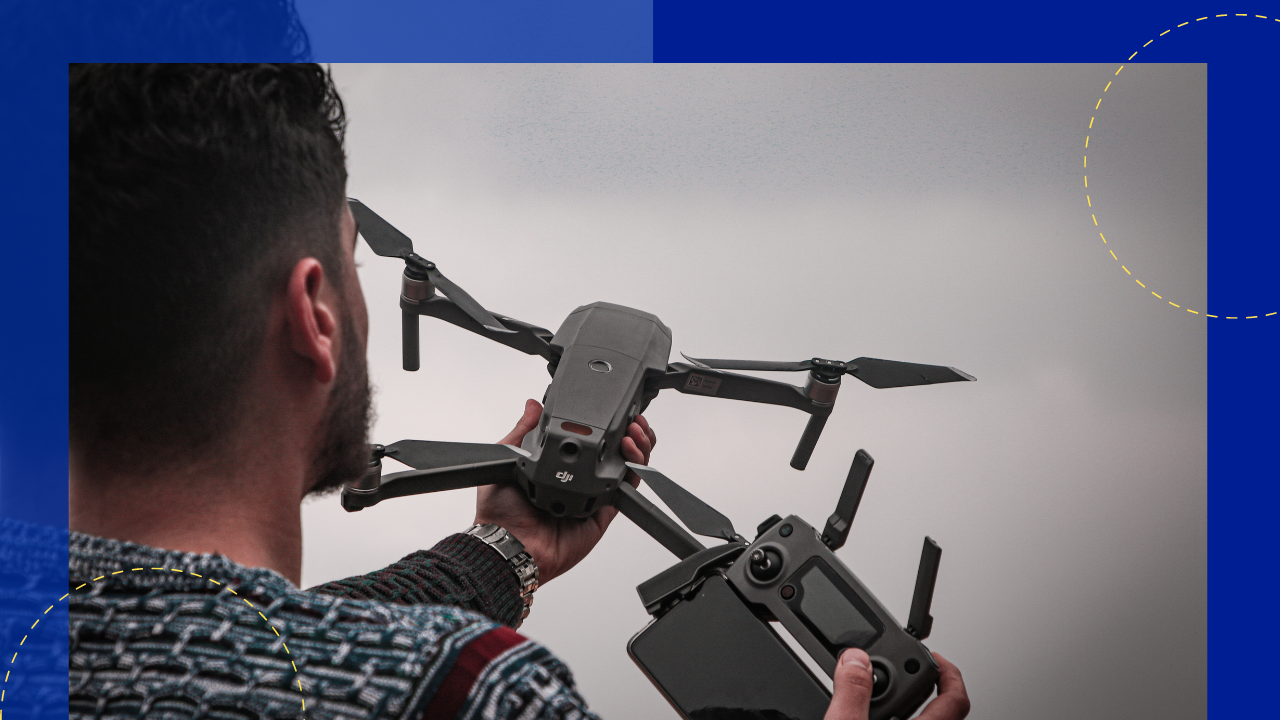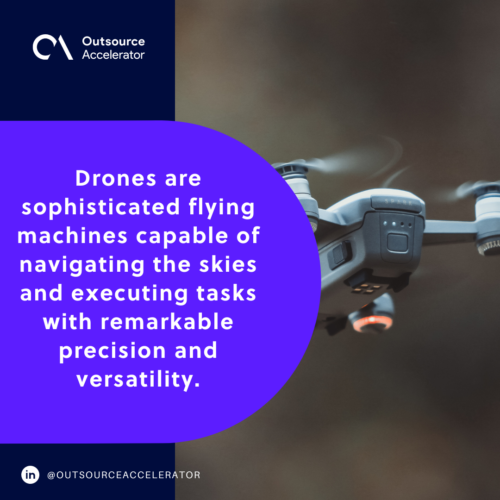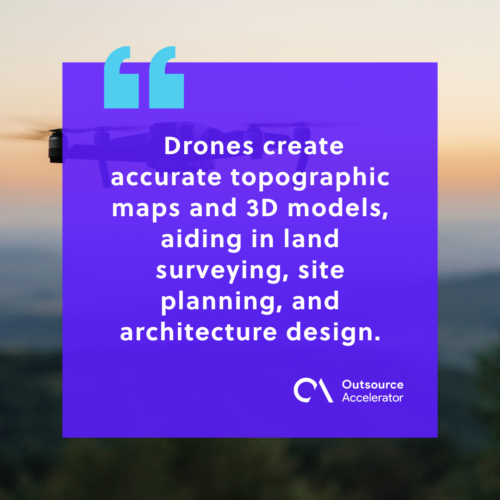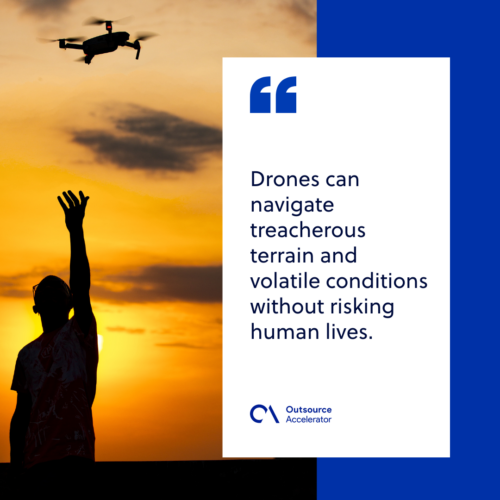Exploring the benefits of drone technology to businesses

Drones, once known as outdoor toys for kids and teenagers, turned out to have immense potential to transform various industries due to their unique capabilities and versatility.
One of the key reasons for the transformative potential of drone technology is its ability to reach difficult or dangerous areas for humans or traditional machinery to access.
Moreover, drones can navigate treacherous terrain, gather critical data, and perform assessments without risking human lives.
Learn more about the various aspects of drone technology, its applications across industries, and its four main advantages to businesses seeking innovative solutions.
What is drone technology?
Drone technology, or unmanned aerial vehicle (UAV) technology, represents a revolutionary advancement in aviation and automation.
Drones are sophisticated flying machines capable of navigating the skies and executing tasks with remarkable precision and versatility.
Human operators can remotely control drones using specialized controllers or software interfaces. The remote control capability allows operators to guide drones through intricate maneuvers and tasks that would otherwise be unfeasible for human pilots.
Drones can also be programmed to follow pre-defined flight paths and waypoints, executed through advanced software systems incorporating GPS navigation, sensors, and algorithms.
The modern drone landscape is characterized by an impressive array of sizes, designs, and capabilities, each tailored to fulfill specific tasks.
Drones span from compact quadcopters to sophisticated fixed-wing models, accommodating diverse applications.
A perfectly-crafted drone technology can capture a wealth of visual and sensory data from the environment, equipped with the following parts:
- Sensors
- HD cameras
- Lidar systems
- Thermal imaging technology
These drone parts have data collection capability for aerial photography, mapping, environmental monitoring, and surveillance.

Drone technology in different industries
As drone technology advances, its impact resonates across many industries. From agriculture to construction, logistics to environmental conservation, drones have found their way into diverse sectors:
Let’s look at how drones revolutionize each industry below:
Agriculture and farming
Farmers can use drones to capture high-resolution images of farmland, analyze crop health, identify areas of concern, and distribute fertilizers and pesticides precisely where needed.
This level of precision minimizes waste, reduces the environmental impact, and optimizes outcomes.
Functionalities
Here are the following useful functions of drone technology in Agriculture:
- Crop monitoring – Drones are equipped with multispectral cameras and sensors that can monitor crops’ health by detecting variations in vegetation and identifying stressed areas.
- Precision spraying – Drones can accurately apply fertilizers, pesticides, and herbicides to specific areas, reducing the use of chemicals and minimizing environmental impact.
- Yield estimation – By analyzing aerial imagery, drones assist in estimating crop yields, enabling better planning for harvesting and distribution. Moreover, they can also facilitate livestock management software development to streamline farm operations.
Construction and real estate
Drones can quickly capture high-resolution images of construction sites, generate 3D models, and track progress over time. Real-time information aids in identifying potential issues, improving project management, and enhancing stakeholder communication.
Functionalities
Here are the following useful functions of drone technology in construction and real estate:
- Site inspection – Project managers can closely inspect construction sites using drones, identifying safety hazards, structural concerns, and deviations from plans.
- Progress tracking – Engineers and architects can use drones to capture images and data regularly, allowing them to monitor construction progress and make informed decisions.
- Mapping and surveying – Drones create accurate topographic maps and 3D models, aiding in land surveying, site planning, and architecture design.
Logistics and delivery
Logistics companies can utilize drone technology to deliver goods quickly and efficiently, particularly in areas with limited infrastructure.
From medical supplies to consumer products, drones have the potential to expedite deliveries and reach remote or inaccessible locations.
Functionalities
In terms of logistics and delivery, drones have the capacity for:
- Rapid deliveries – Drones can transport small packages over short distances, reducing delivery times and improving customer satisfaction.
- Emergency response – Medical providers can deliver medical supplies, vaccines, and other essentials to disaster-stricken or remote areas during emergencies.
- Last-mile delivery – Drones can bridge the gap in the last leg of delivery, especially in congested urban areas where traditional logistics face challenges.

Advantages of drone technology for businesses
Now that we know the functionalities of drone technology for various industries, let’s look at the advantages these drones bring to the general business environment:
Access to remote areas
The ability of drone technology to access remote areas is a significant advantage that holds transformative potential across many industries.
For example, power lines, pipelines, and bridges are often situated in challenging terrains that pose risks to human inspectors.
Drone technology allows inspectors to traverse and gather data from regions challenging for humans or conventional machinery to access.
Rescue and remote inspections
In critical scenarios, drones are invaluable for search and rescue operations. Rapidly deploying drones to disaster-stricken areas enables first responders to do the following while in a remote place:
- Assess the situation
- Locate survivors
- Strategize effective rescue missions
This is particularly critical in hazardous environments like collapsed buildings or industrial sites. Drones can navigate treacherous terrain and volatile conditions without risking human lives.
Reduced human intervention in hazardous tasks
Integrating drone technology offers a significant solution for industries dealing with high-risk tasks.
For instance, mining operations benefit from drones that monitor excavation sites, evaluate stability, and ensure compliance with stringent safety regulations.
By reducing human intervention in these dangerous tasks, businesses enhance worker safety, streamline operations, and minimize potential disruptions.
HD imagery and accurate data capture
Drones with high-resolution cameras and advanced sensors facilitate accurate data capture, a feature with far-reaching implications for various industries.
The resulting imagery and data provide businesses with crucial insights for smart assessment. When meticulously processed and analyzed, this data streamlines operations, optimizes resource allocation, and fosters improved overall business efficiency.

Drone technology brings transformative solutions to industries
Drone technology has transcended its role as a mere recreational gadget and has become an invaluable tool across various industries.
As technology continues to evolve and regulations become more accommodating, the potential of drone technology in shaping the future of industries remains limitless.
Embracing these transformative solutions can position businesses at the forefront of progress and competitiveness!







 Independent
Independent




